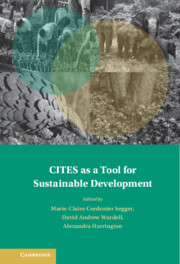Book contents
- CITES as a Tool for Sustainable Development
- Treaty Implementation for Sustainable Development
- CITES as a Tool for Sustainable Development
- Copyright page
- Contents
- Figures
- Tables
- Boxes
- Notes on Contributors
- Preface by CITES Secretary-General, Ivonne Higuero
- Foreword by Honorable Judge Antonio H. Benjamin
- Acknowledgments
- Abbreviations
- Part I Endangered Species, Sustainable Development and the Law
- Part II Sustainable Development in Law and Policy on Endangered Species
- Part III Global Implementation of CITES by Key Species/Commodity
- Part IV National Implementation of CITES
- 11 Sustainable Enterprise Development: Protection of Endangered Species in Omo and Other Potential Biosphere Reserves
- 12 The Biodiversity Multilateral Environmental Agreements Matrix in India: Synergies, Implementation Status and Future Challenges
- 13 Tanzania’s Fight Against Illegal Ivory Trade: Law-Enforcement Failures and Noncompliance with International Environmental Laws
- 14 The Impact of the CITES COP 12 2002 Decision on Mahogany on Peru’s Timber Trade
- 15 Strengthening CITES Compliance: Improving the Management of Resources Preservation and Cross-Border Wildlife Trade in China
- 16 How to Reverse the Fallacy of Command-and-Control in Combating Illegal Trade of Exotic Pets in Brazil
- 17 Lessons on Sustainable Development and Challenges to Illegal Trade: The Case of the Chilean Larch
- 18 The Return of the Markhor: Why CITES Matters
- 19 New Technologies for Effective Biodiversity Governance: Lessons from Orangutans in Indonesia
- 20 Regulation of Import of Hunting Trophies of Exotic Species into India by Framing a Look-Alike Policy to Conserve Indigenous Wild Fauna
- 21 Legislation for the Control of the Timber Trade in the Democratic Republic of Congo and the Congo Basin
- 22 To List or Not to List: Governance Challenges and Complexities in Global Frankincense Supply Chains
- Part V Emerging Issues and Synergies for CITES in the Context of Sustainable Development
- Part VI Conclusions
- Cases and Court Decisions
- CITES Resolutions and Documents
- Domestic Acts and Regulations
- Multilateral Treaties and Declarations
- Recommended Resources
19 - New Technologies for Effective Biodiversity Governance: Lessons from Orangutans in Indonesia
from Part IV - National Implementation of CITES
Published online by Cambridge University Press: 27 July 2023
- CITES as a Tool for Sustainable Development
- Treaty Implementation for Sustainable Development
- CITES as a Tool for Sustainable Development
- Copyright page
- Contents
- Figures
- Tables
- Boxes
- Notes on Contributors
- Preface by CITES Secretary-General, Ivonne Higuero
- Foreword by Honorable Judge Antonio H. Benjamin
- Acknowledgments
- Abbreviations
- Part I Endangered Species, Sustainable Development and the Law
- Part II Sustainable Development in Law and Policy on Endangered Species
- Part III Global Implementation of CITES by Key Species/Commodity
- Part IV National Implementation of CITES
- 11 Sustainable Enterprise Development: Protection of Endangered Species in Omo and Other Potential Biosphere Reserves
- 12 The Biodiversity Multilateral Environmental Agreements Matrix in India: Synergies, Implementation Status and Future Challenges
- 13 Tanzania’s Fight Against Illegal Ivory Trade: Law-Enforcement Failures and Noncompliance with International Environmental Laws
- 14 The Impact of the CITES COP 12 2002 Decision on Mahogany on Peru’s Timber Trade
- 15 Strengthening CITES Compliance: Improving the Management of Resources Preservation and Cross-Border Wildlife Trade in China
- 16 How to Reverse the Fallacy of Command-and-Control in Combating Illegal Trade of Exotic Pets in Brazil
- 17 Lessons on Sustainable Development and Challenges to Illegal Trade: The Case of the Chilean Larch
- 18 The Return of the Markhor: Why CITES Matters
- 19 New Technologies for Effective Biodiversity Governance: Lessons from Orangutans in Indonesia
- 20 Regulation of Import of Hunting Trophies of Exotic Species into India by Framing a Look-Alike Policy to Conserve Indigenous Wild Fauna
- 21 Legislation for the Control of the Timber Trade in the Democratic Republic of Congo and the Congo Basin
- 22 To List or Not to List: Governance Challenges and Complexities in Global Frankincense Supply Chains
- Part V Emerging Issues and Synergies for CITES in the Context of Sustainable Development
- Part VI Conclusions
- Cases and Court Decisions
- CITES Resolutions and Documents
- Domestic Acts and Regulations
- Multilateral Treaties and Declarations
- Recommended Resources
Summary
The author signals that lowland tropical forests are being converted into agricultural lands at fast rate, especially in South East Asia. As he underlines, this has dire consequences for great apes; all species of great apes are categorized as (Critically) Endangered according to the IUCN Red List. The author explains that Sumatran orangutan (Pongo abelli) could be the first of the great apes to face extinction, highlighting the agricultural deforestation taking place in the remote areas of Indonesia, and that access to information is limited, making difficult to take decisions and enforce law. However, in the case of the coastal peat swamp forest of Tripa, the author explains that NGOs have been able to use modern technology and field verification tools to access, gather, monitor and widely provide accurate and up-to-date evidence on pressing environmental issues (ex. deforestation trends, peat depths, fires.
- Type
- Chapter
- Information
- CITES as a Tool for Sustainable Development , pp. 315 - 333Publisher: Cambridge University PressPrint publication year: 2023



